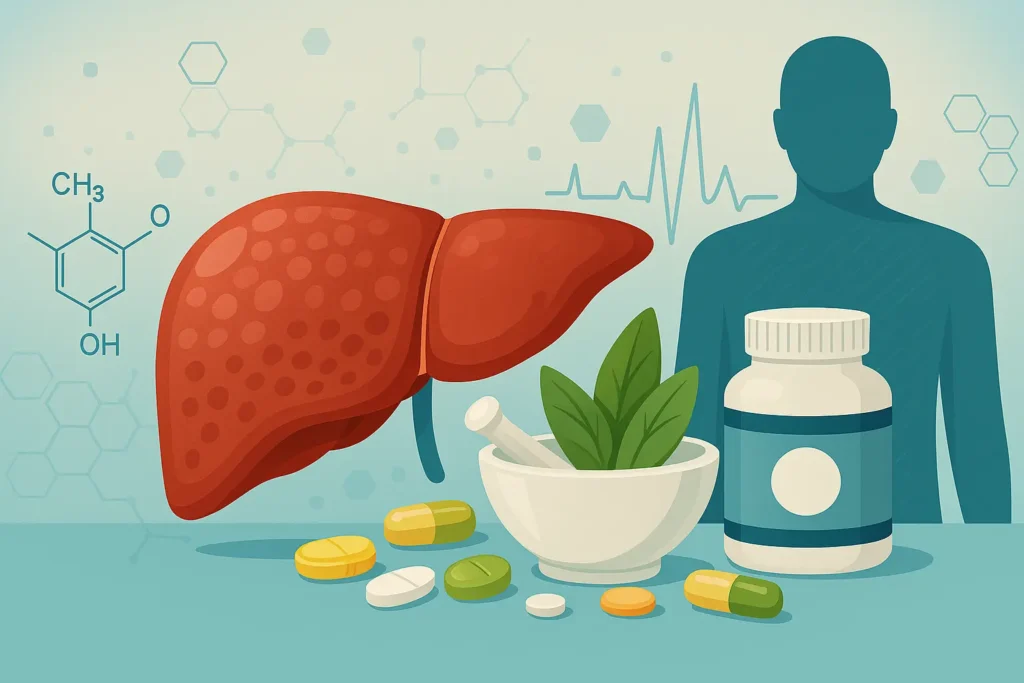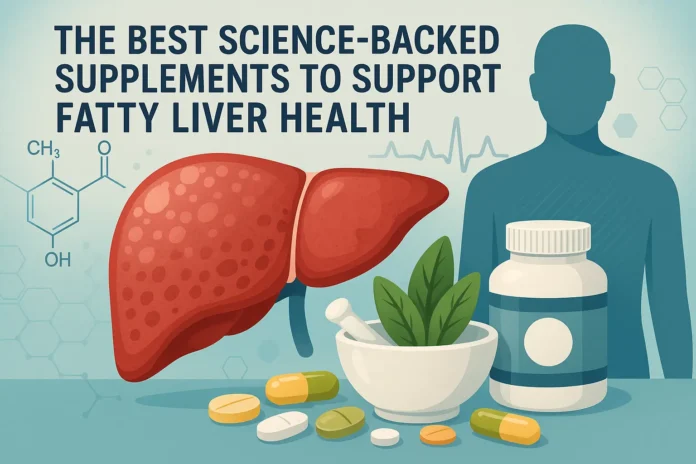Fatty liver disease is a growing concern, and while dietary changes are paramount, many wonder if supplements can offer additional support. With so much conflicting information available, it’s crucial to identify supplements backed by scientific evidence that are both effective and safe.
Curcumin (from Turmeric)
Curcumin, the active compound in turmeric, shows promise in helping reverse fatty liver. Its effectiveness stems from its ability to:
- Lower blood sugar.
- Improve insulin sensitivity.
- Remedy metabolic dysfunction, all hallmarks of fatty liver disease.
Curcumin achieves this by stimulating glucose uptake in fat and muscle cells via GLUT4 transporters, clearing glucose from the bloodstream. It also regulates the AMPK pathway, similar to the diabetes medication metformin, and influences gene expression of glucose transporters in the pancreas, promoting natural insulin secretion.
A 2019 meta-analysis of nine randomized controlled trials indicated that curcumin supplementation significantly decreased liver markers (ALT and AST) and favorably impacted metabolic parameters in fatty liver patients.
Omega-3 Fatty Acids (EPA and DHA)
Omega-3s, particularly EPA and DHA, can aid in reversing fatty liver through several mechanisms:
- Reduced Inflammation: They lower the production of pro-inflammatory cytokines, which are a major component of the fatty liver disease process.
- Decreased Triglycerides: Omega-3s help reduce triglyceride levels.
- Enhanced Fatty Acid Oxidation: They promote the burning of fatty acids, further reducing fat accumulation in the liver.
A systematic review and meta-analysis of 11 randomized controlled studies showed that omega-3 supplementation significantly reduced liver markers and marginally decreased liver fat content.
Important Caveat: While beneficial, higher doses of omega-3s have been linked to an increased risk of atrial fibrillation, an abnormal heart rhythm that can lead to strokes and heart failure. It is crucial to discuss omega-3 supplementation with your doctor, as both risks and benefits increase with higher doses. For most individuals, obtaining omega-3s from food sources like seafood, walnuts, and chia seeds is generally preferred over high-dose supplementation.
Probiotics and Prebiotics (Synbiotics)
The gut microbiome plays a significant role in liver health, especially concerning fatty liver disease. Studies show that individuals with fatty liver often have increased intestinal permeability, leading to the translocation of gut bacteria to areas like the lymphatic system and liver, which can trigger liver inflammation and potentially lead to NASH (non-alcoholic steatohepatitis), a more severe form of fatty liver disease.
An umbrella review of systematic reviews and meta-analyses published in 2022 found that probiotic supplementation was associated with an improvement in liver markers (ALT, AST, and GGT) and appeared safe with no evidence of adverse events.
For optimal benefit, consider a symbiotic approach, combining probiotics (helpful gut bacteria) with prebiotics (non-digestible fibers that serve as food for good bacteria). A small randomized controlled trial in Brazil demonstrated that a symbiotic mixture reduced hepatic steatosis and improved metabolic parameters like body weight, BMI, and waist circumference. You can get prebiotics from natural foods like apples, bananas, oats, chickpeas, asparagus, and red kidney beans.

Choline
Choline has gained attention as a potential treatment for fatty liver. A recent case-control study showed an 81% reduction in hepatic steatosis among people with high choline and betaine intake. However, more conclusive research is needed to determine the benefits of choline supplementation for the general population and appropriate dosages. It’s recommended to prioritize choline intake through foods like eggs (with yolks), lean meats, dairy, and seafood.
Berberine
Berberine, an alkaloid derived from medicinal plants used in Ayurvedic and Chinese medicine, shows promise for fatty liver. A meta-analysis of six clinical trials involving over 500 patients indicated that berberine treatment positively affected liver function, blood glucose, and cholesterol in fatty liver patients. Animal studies also suggest berberine can modulate the microbiome to increase GLP-1 hormones, similar to diabetes and obesity drugs like semaglutide.
Co-enzyme Q10 (CoQ10)
CoQ10 is recognized for its anti-inflammatory benefits, and inflammation is a significant factor in fatty liver development. A small double-blind, placebo-controlled randomized control trial of 44 participants found that 100 mg of CoQ10 for 12 weeks significantly decreased liver markers (ALT and GGT) and inflammation markers (CRP and TNF-alpha). While promising, this was a small trial, and more research is needed. A recent meta-analysis of six studies showed significant improvement in liver markers in specific subgroup analyses.
Important Consideration: CoQ10 can interact with blood thinner medications, so consult your doctor before taking it.
Vitamin E
Vitamin E is a natural antioxidant. An older randomized controlled trial demonstrated that 800 international units of vitamin E per day were associated with a significantly higher rate of improvement in non-alcoholic steatohepatitis. A recent review of meta-analyses and randomized controlled trials also showed that vitamin E supplementation improved liver fibrosis, steatosis, and liver markers (ALT and AST).
Critical Warning: High doses of vitamin E have been associated with an increased risk of all-cause mortality and prostate cancer. Therefore, vitamin E supplementation is generally only recommended for individuals with more advanced fatty liver disease, and it’s imperative to discuss dosage and formulation with your doctor.
Beyond Supplements: Food as Medicine
It’s important to remember that these supplements can enhance and expedite recovery from fatty liver, but they are not a substitute for fundamental lifestyle changes. The most impactful way to address fatty liver disease is by focusing on a healthy diet and using food as your primary medicine.
Always consult with your healthcare provider before starting any new supplement regimen, especially if you have existing health conditions or are taking other medications.


